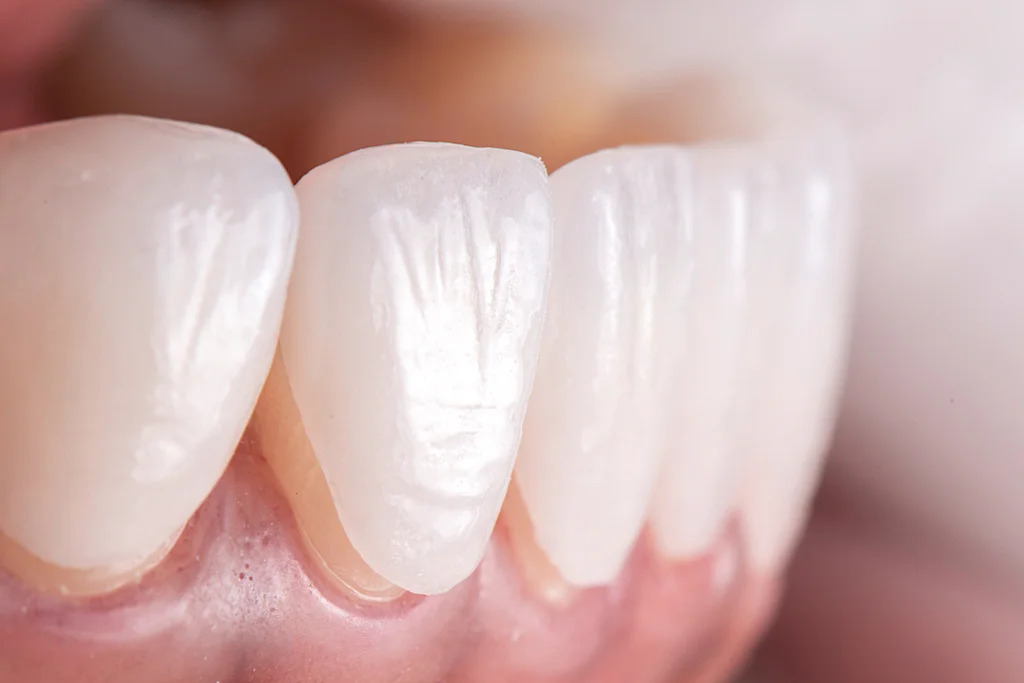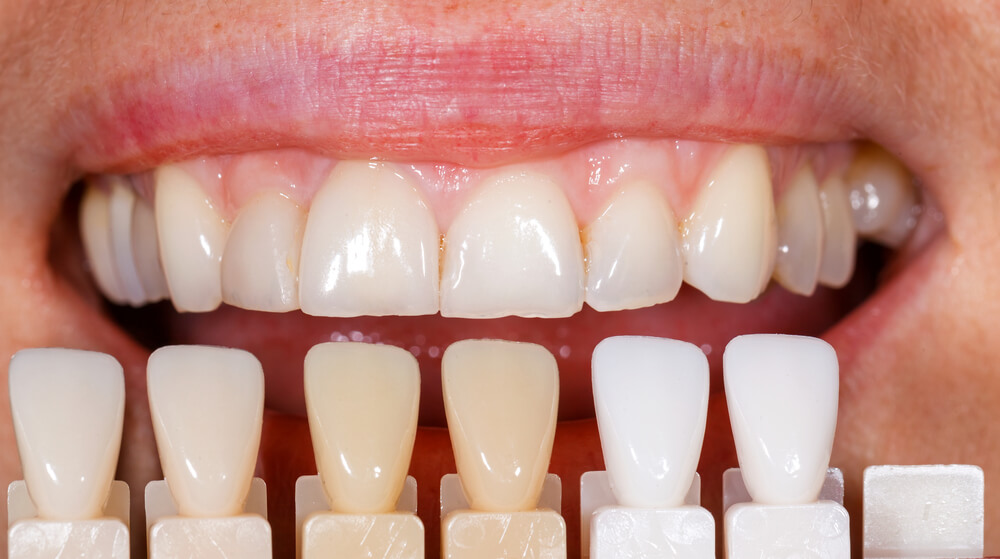Porcelain veneers and traditional dental crowns are two of the most popular cosmetic dentistry treatments for enhancing or restoring your smile. Although both of these procedures can improve the appearance of teeth and fix dental issues, they’re designed for different things. You can make the right choice for your dental treatment by understanding the differences between porcelain veneers and crowns.

We’ll talk about what each option offers, when they’re most effective, and what to consider when choosing between veneers and crowns.
What Are Porcelain Veneers?
Porcelain veneers are thin, custom-made shells that cover the front of your teeth to make them look better. Typically used for cosmetic reasons, they offer a permanent solution to whitening, reshaping, and aligning teeth.
When Are Veneers Ideal?
Veneers are a great option for addressing issues like:
- Discolored teeth that don’t respond to whitening
- Minor misalignments or uneven spacing
- Cracked or chipped teeth
- Teeth that are worn down
- Irregularly shaped teeth
Getting porcelain veneers is a mildly uncomfortable procedure, meaning a small amount of enamel has to be removed from the front of the teeth. This gives you a natural-looking result that blends in seamlessly with your existing teeth.
Benefits of Porcelain Veneers:
- Natural-looking appearance
- Stain resistance
- Minimal tooth reduction
- Long-lasting results with proper care
Veneers are primarily cosmetic, which means they’re designed to improve your teeth’s appearance but not necessarily their functionality.
What Are Traditional Crowns?
Traditionally, dental crowns cover damaged or decayed teeth completely. Both the function and appearance of the tooth are restored. Different materials can be used to make crowns, like porcelain, ceramic, or metal. However, porcelain crowns are popular because they look like real teeth.
When Are Crowns Ideal?
Crowns are usually used when a tooth is severely damaged or decayed. They are often recommended for:
- Broken or severely worn teeth
- Teeth with large fillings
- After a root canal procedure
- Strengthening weakened teeth
- Restoring the shape and appearance of severely damaged teeth
Benefits of Traditional Crowns:
- Protect and strengthen damaged teeth
- Restore the tooth completely
- Materials vary based on needs
- Durable and long-lasting
Both functional and cosmetic, crowns take care of the tooth’s appearance as well as its strength and structural integrity.
Veneers vs. Crowns for Damaged Teeth: What’s the Difference?
Both veneers and crowns can improve the look of a damaged tooth, but they serve different purposes. By understanding the key differences, you can choose the right dental solution for your needs.

Coverage:
- Veneers: Cover only the front surface of your tooth. They’re used mostly for cosmetic reasons and are best for minor flaws.
- Crowns: Cover your entire tooth, providing both structural and aesthetic support. They’re best for teeth that are severely damaged or decayed.
Tooth Preservation:
- Veneers: Only require minimal enamel removal. This makes them a more conservative option than crowns.
- Crowns: Crowns require more enamel removal due to their need to fully encase the tooth, which may result in greater damage to the tooth’s natural structure.
Purpose:
- Veneers: Generally cosmetic, they are used to enhance the appearance of the teeth. They are ideal for smile makeovers.
- Crowns: Both cosmetic and restorative, used to strengthen and protect weakened or damaged teeth while improving appearance.
Durability:
- Veneers: They last about ten to fifteen years with proper care, but they can chip if you mistreat them.
- Crowns: Typically last longer, around 15 to 20 years, and provide superior durability, particularly for teeth that endure heavy biting or chewing.
Cosmetic Dentistry Veneers vs. Crowns: Which is the Better Option?
The decision between veneers vs crowns largely depends on the condition of your teeth and your aesthetic goals.
Veneers May Be Right For You If:
- Your teeth are generally healthy and structurally sound, but you want to improve their appearance.
- You have minor cosmetic issues like chips, cracks, or discoloration.
- You want a minimally invasive solution that maintains most of your natural tooth structure.
Crowns May Be Right For You If:
- Your teeth have significant damage or decay.
- You need to strengthen or restore the functionality of a tooth.
- You’ve had a root canal or other significant dental procedure.
- You want a durable solution that offers both cosmetic and restorative benefits.
Porcelain Veneers vs. Traditional Crowns: Factors to Consider
When deciding between porcelain veneers and traditional crowns, several key factors should be taken into consideration:
1. Cost:
- Veneers are typically more affordable than crowns, as they require less material and fewer steps during the procedure. However, they may not be covered by dental insurance if they are purely cosmetic.
- Crowns tend to be more expensive due to the extensive preparation and coverage required. They are often partially covered by dental insurance, especially if they are needed for restorative purposes.
2. Longevity:
Veneers and crowns are both long-lasting options, but crowns tend to last longer. With proper care, veneers still last a long time, but if they get worn or damaged a lot, they might need to be replaced sooner than crowns.
3. Procedure:
Both treatments require multiple visits to the dentist since the veneers and crowns need to fit perfectly. However, crowns may involve more tooth preparation and require a longer healing period if the tooth is damaged.
The Bottom Line
Ultimately, the decision between veneers vs crowns comes down to your individual dental needs and goals. Both are excellent options in cosmetic and restorative dentistry, but they are designed for different purposes.
For teeth in good condition that need minimal alterations, choose veneers. For teeth that are damaged, decayed, or weak, choose crowns for durable, functional restorations.If you are unsure which option is best for you, scheduling a consultation with a skilled dentist like Dr. Alvarado at All Smiles Dental can help you determine the most suitable solution for your smile. Dr. Alvarado can assess your oral health, discuss your cosmetic goals, and create a treatment plan specific to your needs.

